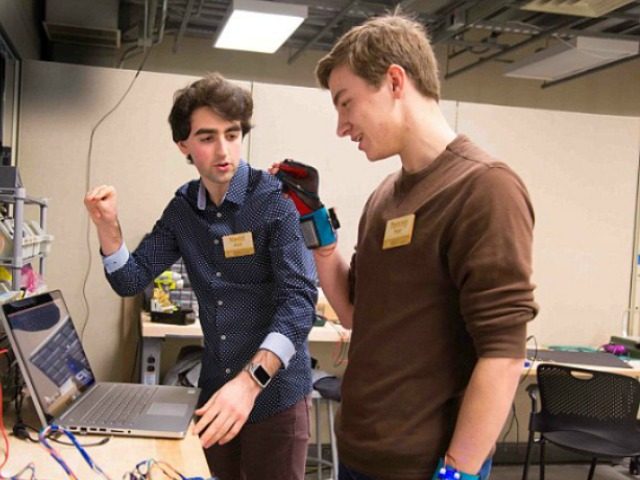Two University of Washington undergraduates have been awarded $10,000 for inventing “SignAloud,” a pair of gloves capable of translating American Sign Language into English in real time.
Sophomores Navid Azodi and Thomas Pryor received the Lemelson-MIT Student Prize for their submission in the undergraduate “Use It” catergory, which recognizes tech-based inventions that improve consumer devices. The “SignAloud” gloves have built-in sensors which read the wearer’s hand positions and movements, then wirelessly transmit them to a computer. The computer then runs the information through a gesture database, using an algorithm to determine the best translation, which is then spoken.
Azodi and Pryor — who are studying Business Administration and Aeronautics and Astronautics Engineering, respectively — met as freshmen, connecting over a similar interest in problem solving and inventing. In addition, the two discovered a common history of strong leadership and research skills, as well as a shared belief in the importance of language. Looking to make a real-world impact, Pryor and Azodi, who are both bilingual, decided to help break down the language barrier for the deaf and hard-of-hearing community.
“When we were talking about things being accessible and connecting people and making that impact we found that language and communication was the piece that holds it all together,” Azodi said. “The idea initially came out of our shared interest in invention and problem solving. But coupling it with our belief that communication is a fundamental human right, we set out to make it more accessible to a larger audience.”
Determined to better connect native ASL speakers with the rest of the world, while capturing the “very difficult” intricacies of sign language, Azodi and Pryor designed SignAloud in the UW CoMotion MakerSpace, a community campus space with tools and equipment available to anyone who wished to tinker or invent. Pryor and Azodi made the award-winning device for less than $100, and plan to use their prize money to improve the prototype. “Now that we have a few extra 0’s,” said Azodi, “we really want to invest back in the gloves and make them more ergonomic and practical to use.”
While there are other sign language translation devices already on the market, many are bulky or awkward and difficult for daily use. Wanting the ASL community to have a practical translating device, Azodi and Pryor designed SignAloud to be an overall improvement on the alternatives. “Our gloves are lightweight, compact and worn on the hands, but ergonomic enough to use as an everyday accessory, similar to hearing aids or contact lenses,” Pryor said.
Although designed with the deaf and hard-of-hearing community in mind, the gloves have potential for commercial use in other fields, such as monitoring stroke patients and enhancing dexterity in virtual reality. In addition, the inventors are already planning on improving the technology so that it can be used with smartphones.

COMMENTS
Please let us know if you're having issues with commenting.